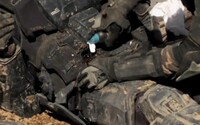Biofoam: Difference between revisions
From Halopedia, the Halo wiki
No edit summary |
m (Added era) |
||
| Line 1: | Line 1: | ||
{{Era|FOR|FS|GOO|H1|H2|H3|H3R|TCP}}{{Ratings}}[[Image:BioFoam.jpg|thumb|right|Biofoam being used in [[Landfall]].]] | {{Era|FOR|FS|GOO|H1|H2|H3|H3R|TCP|HE}}{{Ratings}}[[Image:BioFoam.jpg|thumb|right|Biofoam being used in [[Landfall]].]] | ||
Self-sealing '''Biofoam''' was a marvel of [[UNSC]] medical accomplishment in the 2500's. Biofoam was a space-filling coagulant, antibacterial, tissue-regenerative foam polymer, that is inserted into the skin and even deeper into the body itself. This foam keeps damaged organs in place and helps stop bleeding and hemorrhaging. It is, unfortunately, very painful to use, being described as "burning ants crawling around the wound" or "thousands of tiny knives" stabbing the recipient. It was an improvised medical option when there are no [[medic|medics]] available. Normally, bottles of biofoam are found in a [[Health Pack]].<ref>[[Halo: The Fall of Reach]], page 91</ref><ref>''[[Halo: First Strike]]'', page 123: ''William retrieved a can of biofoam from the rover and inserted the tip into the tiny injection port in his armor—pushed it through the skin between his fourth and fifth ribs. He filled his abdominal cavity with the space-filling coagulant/antibacterial/tissue-regenerative polymer.</ref> Often UNSC medics will use it as a sealing agent during treatment in field hospital. | Self-sealing '''Biofoam''' was a marvel of [[UNSC]] medical accomplishment in the 2500's. Biofoam was a space-filling coagulant, antibacterial, tissue-regenerative foam polymer, that is inserted into the skin and even deeper into the body itself. This foam keeps damaged organs in place and helps stop bleeding and hemorrhaging. It is, unfortunately, very painful to use, being described as "burning ants crawling around the wound" or "thousands of tiny knives" stabbing the recipient. It was an improvised medical option when there are no [[medic|medics]] available. Normally, bottles of biofoam are found in a [[Health Pack]].<ref>[[Halo: The Fall of Reach]], page 91</ref><ref>''[[Halo: First Strike]]'', page 123: ''William retrieved a can of biofoam from the rover and inserted the tip into the tiny injection port in his armor—pushed it through the skin between his fourth and fifth ribs. He filled his abdominal cavity with the space-filling coagulant/antibacterial/tissue-regenerative polymer.</ref> Often UNSC medics will use it as a sealing agent during treatment in field hospital. | ||
Revision as of 15:32, November 27, 2009

Self-sealing Biofoam was a marvel of UNSC medical accomplishment in the 2500's. Biofoam was a space-filling coagulant, antibacterial, tissue-regenerative foam polymer, that is inserted into the skin and even deeper into the body itself. This foam keeps damaged organs in place and helps stop bleeding and hemorrhaging. It is, unfortunately, very painful to use, being described as "burning ants crawling around the wound" or "thousands of tiny knives" stabbing the recipient. It was an improvised medical option when there are no medics available. Normally, bottles of biofoam are found in a Health Pack.[1][2] Often UNSC medics will use it as a sealing agent during treatment in field hospital.
The only downside is that the effects of biofoam are temporary, and after a time (usually a few hours or so) it simply breaks down. Therefore, normally, it is a form of improvised first aid, used only as a temporary sealant until proper medical attention can be sought.
By October of 2552, the UNSC MJOLNIR Mark VI armor contained automatic biofoam injectors, which negated the need for Spartans to use Health Packs.[3]
Related Pages
Sources
- ^ Halo: The Fall of Reach, page 91
- ^ Halo: First Strike, page 123: William retrieved a can of biofoam from the rover and inserted the tip into the tiny injection port in his armor—pushed it through the skin between his fourth and fifth ribs. He filled his abdominal cavity with the space-filling coagulant/antibacterial/tissue-regenerative polymer.
- ^ Halo 2 game guide